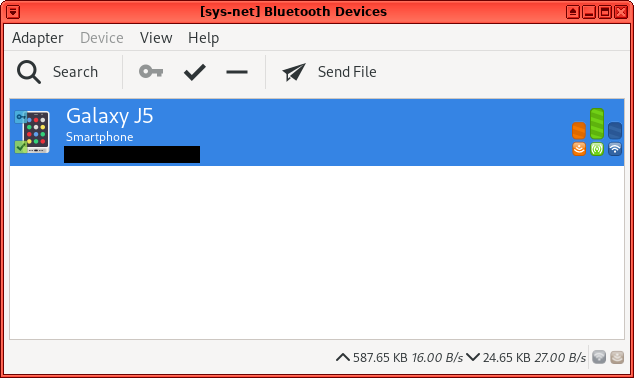mirror of
https://github.com/Qubes-Community/Contents.git
synced 2025-01-26 14:26:00 -05:00
34 lines
1.3 KiB
Markdown
34 lines
1.3 KiB
Markdown
# Graphical Bluetooth configuration
|
|
|
|
Install the package `blueman` in the template of your `sys-usb` qube.
|
|
|
|
```
|
|
sudo dnf install -y blueman
|
|
```
|
|
|
|
Then restart the qube. From now on you should have a tray icon and be ready to connect to bluetooth devices graphically, like so:
|
|
|
|

|
|
|
|
In the picture above I had a sys-net combined to use USB devices too. The procedure stays the same.
|
|
|
|
Note: if you're using a separate sys-usb, and need to attach your bluetooth module to a AudioVM or MediaVM, 'blueman-manager' won't run without a recognized adapter from 'blueman-applet'. Once you attach, you can run 'blueman-manager' and with a script like the below in your AppVM's `rc.local` auto-connect to your preffered device:
|
|
|
|
```
|
|
address="XX:XX:XX:XX:XX:XX"
|
|
|
|
while (sleep 1)
|
|
do
|
|
connected=`sudo hidd --show` > /dev/null
|
|
if [[ ! $connected =~ .*${address}.* ]] ; then
|
|
sudo hidd --connect ${address} > /dev/null 2>&1
|
|
fi
|
|
done
|
|
|
|
```
|
|
The loop should be the last thing in rc.local or appended with `&`. This is a simple solution. (Something more robust would require extra work with `udev` perhaps.)
|
|
|
|
## AudioVM
|
|
|
|
For the most secure scenario, one should be running an AudioVM rather than rely on having PulseAudio in dom0. The creation of such a VM is beyond the scope of this guide.
|